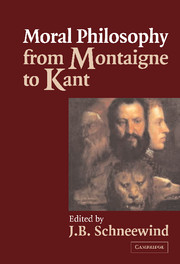Book contents
- Frontmatter
- Contents
- Preface
- Acknowledgments
- Foreword to the One-Volume Reprint
- Introduction
- PROLEGOMENA: SOME QUESTIONS RAISED
- PART I REWORKING NATURAL LAW
- PART II INTELLECT AND MORALITY
- PART III EPICUREANS AND EGOISTS
- PART IV AUTONOMY AND RESPONSIBILITY
- The Earl of Shaftesbury
- Francis Hutcheson
- Joseph Butler
- David Hume
- Christian August Crusius
- Richard Price
- Jean-Jacques Rousseau
- Thomas Reid
- Immanuel Kant
- Supplemental Bibliography
Immanuel Kant
Published online by Cambridge University Press: 05 June 2012
- Frontmatter
- Contents
- Preface
- Acknowledgments
- Foreword to the One-Volume Reprint
- Introduction
- PROLEGOMENA: SOME QUESTIONS RAISED
- PART I REWORKING NATURAL LAW
- PART II INTELLECT AND MORALITY
- PART III EPICUREANS AND EGOISTS
- PART IV AUTONOMY AND RESPONSIBILITY
- The Earl of Shaftesbury
- Francis Hutcheson
- Joseph Butler
- David Hume
- Christian August Crusius
- Richard Price
- Jean-Jacques Rousseau
- Thomas Reid
- Immanuel Kant
- Supplemental Bibliography
Summary
Introduction
Immanuel Kant was born in 1724 in Königsberg (now called Kaliningrad) in the eastern part of Prussia. A child of poor parents, he received scholarships that enabled him to go to school and to the small university in his hometown. After graduation he served as a tutor for wealthy local families and then obtained a position at the university. There he taught until almost the end of his life, never traveling and never marrying. He lectured on a wide variety of subjects (including the art of fortification, which he taught to Russian officers when Königsberg was occupied by Catherine the Great's troops during the 1750s), generally attracting a large number of students. Kant kept up with developments in science, literature, and world affairs; was one of the founders of the discipline of physical geography; introduced a course on anthropology; and made contributions to our understanding of the movement of the weather. His main work, however, was in philosophy, and there, it is generally agreed, what he wrote was epoch making.
Though Kant published several books and essays while he was young, his major writings began to appear only when he was in his middle years. In 1781 he published the Critique of Pure Reason, announcing a radical break with the epistemology and metaphysics of the entire philosophical past. He then proceeded to elaborate the implications of his new outlook for history, ethics, aesthetics, religion, and politics in a series of books and articles that he continued to write until a year or two before his death in 1804.
- Type
- Chapter
- Information
- Moral Philosophy from Montaigne to Kant , pp. 651 - 664Publisher: Cambridge University PressPrint publication year: 2002

